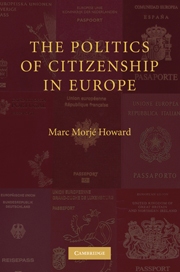Book contents
- Frontmatter
- Contents
- List of Figures
- List of Tables
- Preface
- Introduction
- PART I ARGUMENT
- 1 Citizenship in Cross-National Perspective
- 2 Historical Variation and Legacies
- 3 Continuity and Change in the Contemporary Period
- PART II CASES
- Conclusion
- Appendix I Detailed Breakdown of the Three CPI Components
- Appendix II Naturalization Rates for the EU-15
- References
- Index
2 - Historical Variation and Legacies
The Impact of Colonialism and Early Democratization
Published online by Cambridge University Press: 05 June 2012
- Frontmatter
- Contents
- List of Figures
- List of Tables
- Preface
- Introduction
- PART I ARGUMENT
- 1 Citizenship in Cross-National Perspective
- 2 Historical Variation and Legacies
- 3 Continuity and Change in the Contemporary Period
- PART II CASES
- Conclusion
- Appendix I Detailed Breakdown of the Three CPI Components
- Appendix II Naturalization Rates for the EU-15
- References
- Index
Summary
INTRODUCTION
Before explaining the relative change in citizenship policies over the past several decades – which is the purpose of the rest of the book – we must first account for the existence of historical variation. Indeed, as discussed in Chapter 1, although obviously some legal tinkering took place between the early twentieth century and the 1980s, for the most part the laws in the latter time period remained fundamentally similar, and in many cases completely unchanged. This chapter therefore takes a step back and attempts to explain the historical variation in citizenship policies across the area that eventually became the EU-15. In other words, this chapter investigates the reasons for the wide empirical disparities shown in Table 1.1, where seven countries could be characterized as restrictive, four as medium, and only four (Belgium, France, Ireland, and the United Kingdom) as historically liberal.
In this chapter, I develop two main arguments, and I then show how they help to explain the trajectories taken by each country. First, I focus on colonialism, arguing that former large-scale colonial powers were more likely to develop relations – even if exploitative and unjust – with the outside world, and thereby to create more open historical policies on both immigration and citizenship. Second, I examine the onset of democratization, and I argue that countries that democratized during the nineteenth century were more likely to develop a civic conception of national identity, thereby tolerating – even if reluctantly – the inclusion of foreigners as members of their societies.
- Type
- Chapter
- Information
- The Politics of Citizenship in Europe , pp. 37 - 51Publisher: Cambridge University PressPrint publication year: 2009



